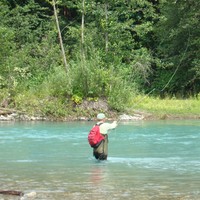This question originally appeared on Quora. 
Answer by David Chan, MD
It depends on whether you desire a very fast sudden death or some time to gather friends and family members. I would personally not want to die a sudden death, although it's absolutely easiest on the person dying.
Probably the most common and least painful sudden death is having ventricular fibrillation. The heart stops beating and there's inadequate blood flow to the brain. It's very fast. The person is unaware, becomes unconscious, and quickly dies.
But for family members and friends, the aftermath is just awful. There was absolutely no preparation, no last hugs, no goodbyes, and often a lot of personal loose ends. No chances for mending fences and a lot of unfinished stuff.
I think that I'd prefer something a little slower.
Dying of liver failure is generally pain free. The liver is important in clearing metabolites from the blood stream. When the liver stops working, certain metabolites build up in the blood and suppress brain function. Pain perception and judgement are reduced, and the patients are generally unaware.
In early liver failure, there is increased drowsiness and sedation. As the liver failure progresses, the patient becomes more sleepy and then eventually slips into a coma.
Some patients have itching of the skin due to elevated bilirubin, which gives the skin and the whites of the eyes a yellow hue. It's generally just annoying and can be treated with sedatives and anti-histamines.
Since the failing liver also cannot metabolize narcotics and sedatives, patients who have pain or agitation for other reasons experience a significant reduction in both. For these unfortunate patients, death is peaceful for both them and their families.
Why would I prefer not to have sudden death?
I'd want the chance to be with family and close friends and give them a little preparation before I died. Since I'm an oncologist, I see how valuable it is for many patients to have some warning. I've had countless patients take advantage of knowing they faced death in the near term. They've had the opportunity to complete wills/trusts and make strategic plans for transfer or sale of businesses. They also get the chance to mend fences, if not for themselves, then for others.
A number of years ago, I cared for a remarkable man with a very successful family business. He had two sons who were themselves professionally successful but estranged from each other for several decades. Over the course of a couple of months, he was able to meet with them, remind them of how close they were when growing up, and was able to engineer a rapprochement.
Near the end of his life, the sons came with their mother to every appointment, and it was clear that they were once again a family.
The sons agreed to work together to manage the family business. He gave one son his prized Jaguar XKE two seater classic convertible sports car and the other son all his fishing rods, hunting rifles, and shotguns. His wife, although obviously despondent over his illness, was gratified that they got one more chance and were a family once again.
My patient told me that he was very satisfied with how his life turned out and how he would have regretted dying suddenly and leaving behind a family mess and a business he was very proud to have built that probably would have otherwise gone under.
Of course we all know that we should live life as if each day was our last. Nobody I know can do that. But some people are able to take advantage of their warning.
More questions on Death and Dying: